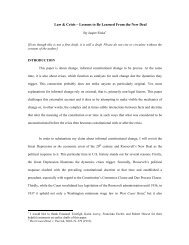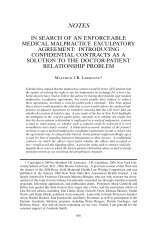Guide to Foreign and International Legal Citations - New York ...
Guide to Foreign and International Legal Citations - New York ...
Guide to Foreign and International Legal Citations - New York ...
You also want an ePaper? Increase the reach of your titles
YUMPU automatically turns print PDFs into web optimized ePapers that Google loves.
I. COUNTRY PROFILE (Civil Law)<br />
RUSSIA<br />
Rossiiskaya Federatsiya (Russian Federation)<br />
Russia is a federation comprised of twenty-one Republics (respublika), six Terri<strong>to</strong>ries<br />
(krai), 49 Regions (oblast’), two federal cities, one Au<strong>to</strong>nomous Region (av<strong>to</strong>nomnaya oblast’),<br />
<strong>and</strong> ten Au<strong>to</strong>nomous Circuits (av<strong>to</strong>nomnii okrug)—a <strong>to</strong>tal of eighty-nine identifiable units which<br />
are commonly referred <strong>to</strong> as Subjects of the Russian Federation (sub’ekti Rossiiskoi Federatsii).<br />
The official language is Russian. Russia’s legal system is based on civil law.<br />
The Russian Constitution, which was adopted December 12, 1993, establishes the form<br />
of government. Executive power is vested in the President <strong>and</strong> the Government. The President,<br />
who is the head of state, is directly elected by the people <strong>to</strong> a four-year term. The President<br />
coordinates the function <strong>and</strong> interaction of the state agencies, acts as the Chief of the Army <strong>and</strong><br />
appoints the Chairman of the Government. The president may enact decrees without the consent<br />
of the legislature. The Premier, who is the head of Government, is appointed by the President<br />
<strong>and</strong> must be confirmed by the lower house of the legislature. Other Ministers are appointed by<br />
the President. Collectively, the Premier <strong>and</strong> other Ministers form the Ministries of Government<br />
(or, simply, the Government).<br />
Legislative power is vested in the bicameral Federal Assembly (Federal’noe Sobranie),<br />
but, as noted, may also be exercised by the President. The Federal Assembly is composed of the<br />
Federation Council (Soviet Federatsii) <strong>and</strong> the State Duma (Gosudarstvennaya Duma). Two<br />
Members of the 178 member Federation Council are appointed by the <strong>to</strong>p executive <strong>and</strong><br />
legislative officials of each Subject of the Russian Federation <strong>to</strong> four-year terms. Half of the 450<br />
Members of the State Duma are directly elected by the people on the basis of proportional<br />
representation, <strong>and</strong> the other half are directly elected by the people from single-member districts.<br />
All Members of the State Duma serve four-year terms.<br />
Judicial power is vested in the Courts, which include the Constitutional Court<br />
(Konstitutsionnii Sud Rossiiskoi Federatsii), the Supreme Court (Verhovnii Sud Rossiiskoi<br />
Federatsii), <strong>and</strong> the Superior Court of Arbitration. Judges of all courts are appointed for life by<br />
the Federation Council on the basis of the President’s recommendations. The Constitutional<br />
Court reviews, inter alia, the constitutionality of acts of legislative <strong>and</strong> executive branches <strong>and</strong><br />
disputes regarding competence. Below the Constitutional Court the judicial system is bifurcated<br />
in<strong>to</strong> courts of general jurisdiction, which deal with civil, criminal, <strong>and</strong> military matters <strong>and</strong><br />
arbitration courts which deal with economic matters.<br />
The Supreme Court is the highest court of general jurisdiction. It hears cases involving<br />
civil, administrative, criminal, <strong>and</strong> military law. The Supreme Court has appellate jurisdiction<br />
over the decisions of the intermediate appellate courts. The intermediate appellate courts for<br />
civil <strong>and</strong> criminal matters are known as the Supreme Courts of each Subject of the Russian<br />
Federation. These courts have appellate jurisdiction over the decisions of the District Courts,<br />
which are the courts of first instance. The Supreme Court <strong>and</strong> Supreme Courts of each Subject<br />
of the Russian Federation also act as courts of first instance for certain cases. There is also a<br />
system of Justices of the Peace (mirovie sud’i) which hears civil, administrative, <strong>and</strong> criminal<br />
cases of lesser importance.<br />
All economic disputes are litigated in arbitration courts. The system of arbitration courts<br />
is also three-tiered. The highest court is the Supreme Arbitration Court (Visshii Arbitrazhnii Sud<br />
157
















